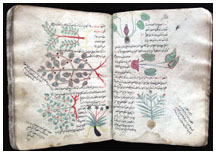
|
|
November 16, 2005: From the Editor
This Arabic botanical manuscript from the 15th century is part of the Robert Garrett Collection. (Denise Applewhite) |
It’s fair to say that PAW writer Mark F. Bernstein ’83 accepted the assignment for this issue’s cover story with a bit of trepidation. He was to profile “parent coach” Julie King ’82 by writing a first-person account of his experience in one of King’s parenting seminars. Since the ground rules prohibited him from identifying other parents in the session, Bernstein realized that, as he writes here, “the only person who will be publicly identified in this article as a bad parent is me.”
For the record, Bernstein has two happy, curious, well-behaved girls — so he and his wife must be doing a lot right. And not everything this East Coast parent learned at King’s California class was a perfect fit — he was, he quickly learned, probably the most conservative parent in the group. But he did learn some techniques to add to his parenting repertoire.
Sensing that other Princeton parents could use a word or two of advice, King, who teaches a popular Marin County workshop called “How to Talk So Kids Will Listen and Listen So Kids Will Talk” and maintains a Web site at www.julieking.org, has agreed to answer parenting questions. Send your questions to paw@princeton.edu along with your contact information. Questions and responses will be published at PAW Online. (As parenting questions might cause a twinge of embarrassment, names will not be published without permission — after all, we have kids, too.)
Also in this issue, Merrell Noden ’78 writes about the soaring prices of literary and other manuscripts — making it hard for Princeton’s library system to remain competitive in its special collections. Over the years, the library has received much-needed support in that effort from alumni and the Friends of the Princeton University Library, which is celebrating its 75th anniversary this year.
Alumni have contributed some of the library’s most prized possessions. The vast collection of Islamic manuscripts, for example, is based on a donation by Robert Garrett, a member of the Class of 1897 (funding through the David A. Gardner ’69 Magic Project will allow the collection to be catalogued and digitized for easier access); Robert H. Taylor ’30 contributed an extensive collection of English literature; and Leonard Milberg ’53 has contributed collections of Irish and American writers. There are many others.
But as Noden writes, the world of collecting isn’t what it used
to be. Literary and other manuscripts have sold recently for millions
of dollars, and curators at many universities, including Princeton, often
are left on the sidelines. The Friends are attempting to assist in the
effort again, and have established an anniversary fund to “enable
the library to become competitive with other institutions.” It’s
a significant challenge for this anniversary year. ![]()
![]()
Marilyn H. Marks *86
mmarks@princeton.edu

